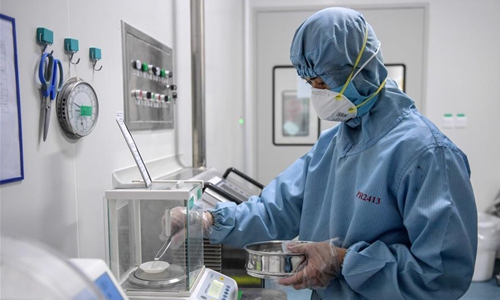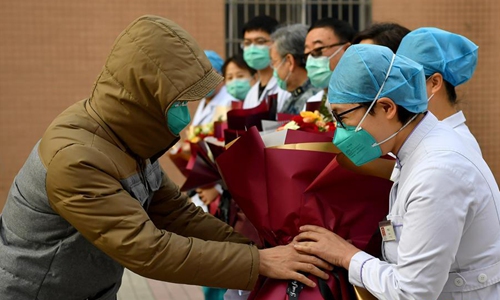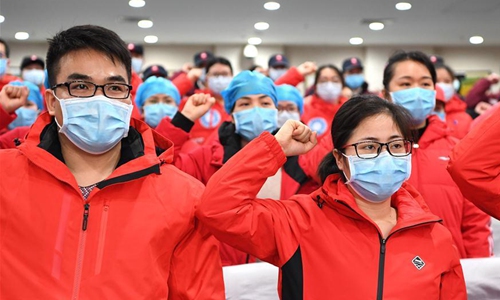Chinese institute applies for patent for usage of US-made medicine against 2019-nCov

A worker weighs drugs at the workshop of a pharmaceutical company in Haikou, south China's Hainan Province, Feb. 3, 2020. The workshop of a pharmaceutical company in Haikou has been working round the clock since Jan. 20 to ensure the supply of drugs during the fight against novel coronavirus outbreak. (Photo by Pu Xiaoxu/Xinhua)
The number of confirmed cases of the novel coronavirus approached 25,000 in China with a total of 492 reported deaths on Wednesday. As the extended Spring Festival holidays drew to a close, Chinese people are eagerly looking forward to the ever closer "miracle drug" that could lift the country out of the ongoing epidemic crisis.
The distance toward a "miracle drug" was seemingly shortened on Wednesday when several governmental ministries and research institutes announced on the same day that they had discovered a drug effective in dealing with drugs in vitro.
But at the same time, controversy roared over intellectual property following an institute in Wuhan applying for the patent usage of a medicine developed in the US.
The Wuhan Institute of Virology under the Chinese Academy of Sciences released a statement on its website on Tuesday, saying their researchers discovered that two medicines - Remdesivir and chloroquine - may effectively inhibit the development of the novel coronavirus (2019-nCoV) in patients.
The results have been delivered to related authorities nationwide and require clinical verification, read the statement.
Chloroquine is a medicine that has been used to treat malaria since the 1940s. It has been sold on the Chinese market and can be independently provided, according to the institute.
Meanwhile, Remdesivir, GS-5734, a medicine developed by US medicine pro-ducer Gilead Sciences, is in phase two and three clinical research into its effectiveness against the Ebola virus in Congo.
In order to protect national interest, the institute said that it applied to patent the discovery of Remdesivir effectiveness to deal with the 2019-nCov and would apply for patents in other countries and regions through the Patent Cooperation Treaty.
The institute called for foreign companies to withhold enforcing lawful patent rights to assist China's fight against the coronavirus epidemic.
The Wuhan institute's patent application triggered heated discussions on Chinese social media. Some questioned the institute's eligibility to apply to patent a medicine made by a US company in China, citing Chinese companies' and institutes' histories of allegedly stealing foreign intellectual property.
For instance, eight Chinese medical equipment companies were sued in the US for intellectual property infringement in 2016.
According to media reports in January 2018, China had been the country facing the largest number of investigations from the US International Trade Commission for a continuous 13 year period.
Gilead Sciences said in an email it sent to the Global Times that Remdesivir has demonstrated in vitro and in vivo activity in animal models against the viral pathogens MERS and SARS, which are coronaviruses that are structurally similar to the current coronavirus. Clinical data in the treatment of MERS and SARS showed that the drug is potentially effective to coronavirus, it said.
It is to be noted that Remdesivir is an experimental drug and only a few 2019-nCov patients have used it, so we do not know clearly its effectiveness and can't be sure that it can be used widely at present.
If the medicine proves safe and effective on 2019-nCov infection, the company said they will provide the medicine to more patients through certain channels. The company are discussing with various institutes across the globe on the possibility of the drug's clinical usage.
The company didn't give any clear commentary on moves from the Wuhan institute.

A patient expresses gratitude to medical staff at Tangdu Hospital of Xi'an Air Force Military Medical University in Xi'an, northwest China's Shaanxi Province, Feb. 4, 2020. The first patient recovering from novel coronavirus infection in Shaanxi Province was discharged from hospital on Tuesday. Photo: Xinhua
Patent controversyChinese experts and lawyers said that the Wuhan institute's application is reasonable and lawful according the Patent Law of China, as Gilead only lays claims to Remdesivir's chemical compounds, while the Wuhan institute has applied for methods of use regarding the pharmaceutical product.
In order to prevent, treat and control epidemic diseases, the Chinese National Intellectual Property Administration (CNIPA) can grant compulsory licenses in a national emergency and extraordinary situation to protect the public's interests, Chen Jihong, an expert in patent law at the Beijing Zhonglun Law Firm, told the Global Times on Wednesday.
While the principle is written in the Patent Law of China, China has never before implemented any such compulsory licenses, Chen noted.
But some experts said that as Gilead has applied for the patent for the usage of Remdesivir on the coronavirus, it is of little possibility that the Wuhan institute's application can be approved by the CNIPA.
In case that the patent is granted, Gilead would have to obtain the license from the Wuhan institute to use Remdesivir for the treatment of the new coronavirus, otherwise it will constitute an infringement in China. And if Gilead declines to give licensing of the drug to the institute for the usage of Remdesivir in the clinical treatment of the new coronavirus, the CNIPA may force patent licensing, given the ongoing epidemic outbreak emergency across China, experts said.
Whether the patent will be granted depends on the assessment of the three elements of a patent: non-obviousness, novelty as well as utility. The whole process is expected to take about two to three years, according to Chen.
Once approved, Gilead and the Wuhan institute could facilitate joint efforts on a cross-licensing agreement, which is very common in international patent licensing practices, as both sides depend on each other, Chen said.
The Wuhan institute announced that it would make its patent applications available to major countries around the world through the Patent Cooperation Treaty, to expand the scope of its patent application.
Although Remdesivir is not yet on the market, the expert said it will not affect patent applications because the drug listing process and patent application process are two separate sets of systems with unrelated standards.
Liu Changqiu, a researcher at the Shanghai Academy of Social Sciences, warned that, even if it is lawful to apply for a patent for its usage, problems related to intellectual property might occur when the medicine is put into clinical use.
By that time, massive production will be required but the medicine will still not be on the Chinese market and Chinese companies will not be allowed to produce it, Liu told the Global Times on Wednesday.
The patent, if approved, would endow China a leverage in cooperation talks with Gilead Sciences for the production of the drug, Sun Guorui, a professor specializing in intellectual property studies at Beihang University, told the Global Times on Wednesday.

Medical team members take an oath before setting out for Hubei Province, in Nanning, south China's Guangxi Zhuang Autonomous Region, Feb. 4, 2020. The second batch of medical teams of 136 members from Guangxi set off on Tuesday to aid the coronavirus control efforts in Hubei. Photo: Xinhua
How far away is the 'miracle drug'According to officials within the Ministry of Science and Technology, a batch of Remdesivir was expected to arrive in China on Tuesday.
The National Medical Products Administration has approved the China-Japan Friendship Hospital and the Chinese Academy of Medical Sciences, two Beijing-based applicants for the testing of Remdesivir, to conduct clinical trials on the drug, Sun Yanrong, an official of the ministry, said at a press conference held by the National Health Commission on Tuesday.
Gilead Sciences said in the email that they have reached agreement with China's health authorities to carry out two clinical trials on patients infected with the coronavirus in order to make sure whether the drug is safe and effective in treating the virus, the company said.
The clinical trials are conducted in Wuhan under the leadership of Chinese research team. Gilead will provide medicines and support free of charges. More details are estimated to be released soon.
According to the Xinhua News Agency, the trials were launched Wednesday afternoon. One of them is to be conducted on treating 308 coronavirus patients with slight and medium symptoms, while the other is for treating 453 patients with much more serious symptoms.
Remdesivir will be applied to the first batch of coronavirus patients from Thursday, the Xinhua News Agency reported.
Besides Remdesivir, researchers have also selected some other drugs seemingly effective for the novel coronavirus, after screening several existing drugs, including Chloroquine phosphate and Favipiravir, as well as some traditional Chinese medicines that contain active antiviral ingredients as drug candidates, for further animal experiments and clinical trials.
In the research and development of drugs in the fight against the novel coronavirus, the priority is to improve the cure rate and reduce fatalities, Sun said.
"The discovery of various potentially effective drugs shows that scientists wish to apply safe and effective drugs in fighting the virus. But the tough problem is that a single successful case can't exclude person-level heterogeneity in widespread treatment," Ma Xiancai, a post-doctorate researcher with the Institute of Human Virology at Sun Yat-sen University in Guangzhou, South China's Guangdong Province, told the Global Times on Wednesday.
Given that the coronavirus has not largely mutated, Ma said there will be effective drugs or vaccines that are able to control and resist the coronavirus, but he refused to estimate how long it would be before the drugs are discovered.
Li Lanjuan, an academician with the Chinese Academy of Engineering, also an-nounced on Tuesday that her team has verified two kinds of effective medicines against the novel coronavirus naming Arbidol and Prezista.
Arbidol is usually used to treat influenza virus while Prezista is usually used against HIV, according to media reports.
The medicines have been put into use in treating novel coronavirus patients in East China's Zhejiang Province and would be used to replace less effective medicines in the future, said Chen Zuobing, a member of Li's team and director of the First Affiliated Hospital, College of Medicine, Zhejiang University, financial news outlet Yicai reported Tuesday.
Development of a vaccine regarding the 2019-nCov is also underway. In an interview with China Central Television (CCTV) on Sunday, Li said that her team had found a few viruses that very suitable to developing vaccines.
In a previous interview with CCTV on January 28, Li said it would take at least one month to develop a vaccine.